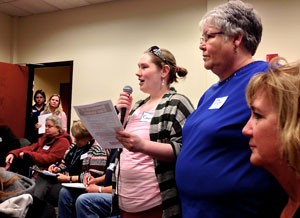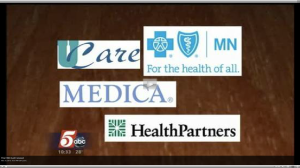Standards of Care Update
MNA nurses and representatives continue to meet with legislators to update them on the goals of the Standards of Care Act. MNA is proposing that hospitals be required to report their staffing plans and actual nurse hours per patient day, and a Department of Health study of hospital staffing and its effect on nursing sensitive indicators like infections, falls and pressure ulcers. We are confident that a MDH study will validate what nurses already know–that proper nurse staffing leads to better nurse outcomes–but we also recognize the need for Minnesota-specific data. Our main objective for the remainder of the 2013 legislative session is to ensure that a comprehensive and accurate study is completed. Ultimately, our goal is safe staffing in every facility, on every unit and during every shift.
We still differ significantly from the hospitals on this bill. So it continues to be very important for nurses to contact our legislators to ask them to support a comprehensive and accurate study.
Contact your state legislators and ask them to support strong consumer transparency language, nurse staffing reporting and a comprehensive study that gathers real data about the correlation between staffing and health outcomes. Let them know unsafe staffing is still a problem for Minnesota patients and we need meaningful data-collection to protect patients.
Click here to use the MNA Grassroots Action Center to send an email.
Possible Sanford/Fairview Merger
Attorney General Lori Swanson is holding a public hearing this Sunday, April 7 at 1:30 pm to shed light on the possible merger of Fairview Health Services and South Dakota-based Sanford Health. This merger would further the trend of the corporatization of healthcare in Minnesota, where profits and productivity are a higher priority than patient care. Please support the Attorney General’s effort to hold these two health care corporations accountable to the taxpayers of Minnesota. RSVP to geri.katz@mnnurses.org.
WHAT: Attorney General Lori Swanson’s public hearing on possible Sanford-Fairview merger
WHEN: Sunday, April 7, 1:30pm
WHERE: Room 15, State Capitol, 75 Rev. Dr. Martin Luther King Jr. Blvd, St. Paul, MN 55155
DIRECTIONS/PARKING INFO: Click here
Meanwhile, the news broke yesterday that the University of Minnesota is also interested in taking over the entire Fairview system. Read the Star Tribune article here.
We are glad to see some competition for this important health care system, and we are looking forward to learning more details about both proposals. Our ultimate concern is that whatever happens, patient care and safety be the first priority of any change to Fairview.
Governor’s Budget
The Governor’s Health and Human Services budget proposal was heard in the legislature this week. The Governor proposes to increase Health and Human Services spending by $170 million, after many years of cuts to services for the elderly, disabled and vulnerable. His proposal would provide access to health care for 145,000 uninsured low-income Minnesotans, invest in school-based mental health services for our children, and reform and streamline the delivery of health care services in Minnesota.
MNA continues to support the Governor’s commitment to progressive taxation and investment in key state priorities.
Mayo “Destination Medical Center” Proposal
MNA has joined other unions to raise questions about Mayo’s request for over half a billion dollars from the state for their “Destination Medical Center” expansion project in Rochester.
We are concerned this plan lacks transparency and leaves too many questions unanswered about patient care, jobs and the impact of the project on the community. For the state to consider such a major investment in a private entity, we believe these questions must be answered first. Read more here.
Willmar State Mental Health Facility
Both the Governor’s supplemental budget and legislation proposed by Willmar lawmakers Sen. Lyle Koenen and Rep. Mary Sawatzky propose keeping the 16-bed state mental health facility in Willmar open. This facility has been slated for closure in past years, so we welcome these proposals and remain dedicated to keeping this important mental health facility open.
Legislator Town Hall Meetings

MNA nurses Cassie Hamilton, Pat Webster and Mary Turner speak up about patient safety at a town hall meeting with Sen. Alice Johnson, Sen. John Hoffman and Rep. Jerry Newton in Coon Rapids on Thursday.
Governor Dayton and many legislators will be holding public meetings this spring to discuss the state budget and hear constituents’ concerns. These meetings are a great opportunity to meet your elected officials close to home, build a relationship with them, and educate them about nursing issues. Please attend a town hall meeting if one is coming up in your district:
Saturday, April 6
Senator Ann Rest
9:30-10:30 am
Robbinsdale City Hall, 4100 Lakeview Avenue North, ROBBINSDALE
Senator Lyle Koenen and Representative Mary Sawatzky
8:30-10:00am – Coffee and conversation
Sunberg Creamery Café, 403 Central Avenue, SUNBURG
Representative Shannon Savick
9:00-11:00am – coffee and conversation
The Bakery, Retail Room, 345 E. Main St., BLOOMING PRAIRIE
Representative John Persell
10:00am-12:00pm – Coffee and conversation
Common Ground Coffee, 1428 Hwy 5, LONGVILLE
Representative Barb Yarusso
10:00am-12:00pm
Mounds View Public Library Meeting Room, 2576 County Road 10, MOUNDS VIEW
Representative Paul Marquart and Senator Kent Eken
10:00-11:00am
Minnesota State Community and Technical College, 1900 28th Ave S, MOORHEAD
Representative Ben Lien
10:00-11:00am
M State Technical School, MOORHEAD
Senator Rod Skoe, Senator Tom Saxhaug and Representative John Persell 1:00 – 2:30pm
Bemidji City Hall, 317 4th Street NW, BEMIDJI
Tuesday, April 9
Governor Mark Dayton, Meetings with Mark town hall tour
6:00-7:30 pm
Conference Hall/ Auditorium at South Central Community and Technical College 1920 Lee Blvd, NORTH MANKATO
Saturday, April 13
Representative Zach Dorholt
9:00-11:00am
Whitney Senior Center, 1527 Northway Dr., ST. CLOUD
Representative Shannon Savick
9:00-11:00am – Coffee and conversation
Prairie Wind coffee, 211 S. Broadway, ALBERT LEA
Representative Mary Sawatzky
9:00-11:00am – Coffee and conversation
Lulu Bean’s, Small downstairs meeting room, 1020 1st St. S, WILLMAR
Tuesday, April 16
Governor Mark Dayton, Meetings with Mark town hall tour
6:00-7:30 pm Commons Area of Mesabi Range Community and Technical College 1001 West Chestnut Street, VIRGINIA





